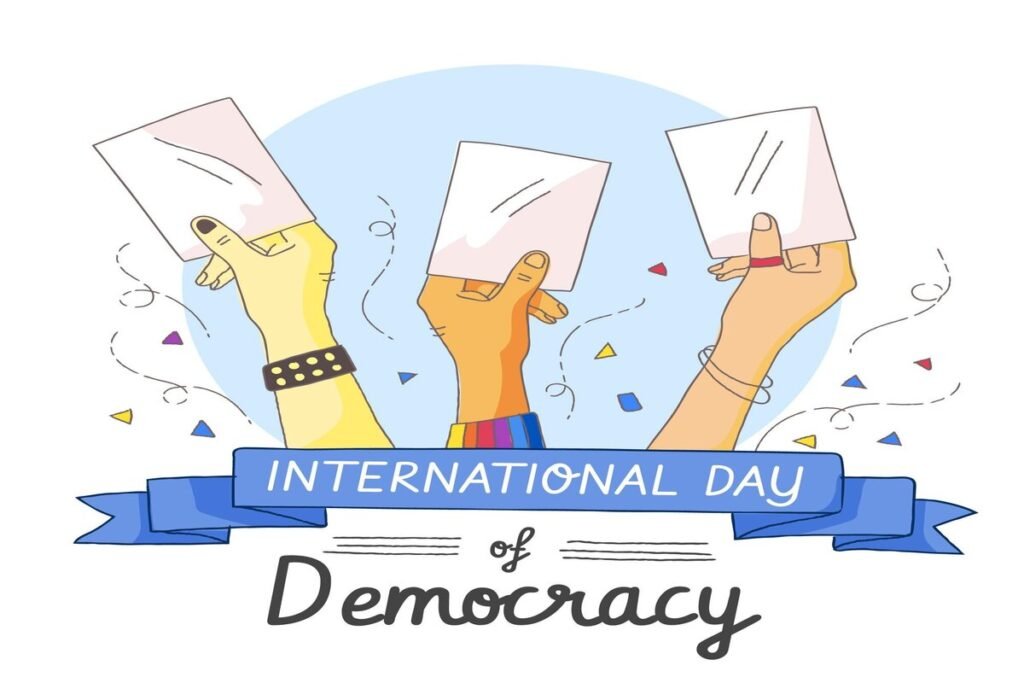15 September 2023 (TDI): International Day of Democracy, observed annually on September 15, is a global celebration of the principles and significance of democracy, a prevalent form of governance worldwide.
This day emphasizes the pivotal role of democracy and democratic systems in fostering collective well-being, equality, and participation across all segments of society.
When emphasizing the significance of democracy, it’s crucial to provide an accurate definition.
Democracy essentially embodies the idea of popular sovereignty, as articulated by Abraham Lincoln, where it is a form of governance characterized by “government of the people, by the people, for the people.”
Fundamentally, it involves the population’s ability to select a government through periodic, open, and equitable elections.
Freedom
— United Nations (@UN) September 14, 2023
Human rights
Free & fair elections
↪️ These are the essential elements of democracy.
More on Friday’s #DemocracyDay: https://t.co/Ng4TCszNce #StandUp4HumanRights pic.twitter.com/9ARQ6xGW4g
In 2007, the United Nations General Assembly (UNGA) established the International Day of Democracy on September 15, following the official adoption of a resolution.
The origins of this day can be traced back to the Universal Declaration on Democracy, ratified on September 15, 1997, by the Inter-Parliamentary Union (IPU), an international organization representing national parliaments from various countries.
Also Read: European Endowment for Democracy celebrates 10-year Anniversary
Qatar played a prominent role in advocating for the recognition and promotion of this day. Ultimately, on November 8, 2007, the UNGA unanimously passed a resolution.
Officially designating it as the “International Day of Democracy” with the title, “Support by United Nations system of efforts of governments to promote and consolidate new or restored democracies.” The first official celebration of this day took place in 2008.
2023 International Day of Democracy Theme: Empowering the Next Generation
The theme for the 2023 International Day of Democracy is “Empowering the Next Generation.”
This theme underscores the significant role that young people have in driving forward the democratic process and ensuring that their perspectives are considered in decisions that hold substantial consequences for their future.
Essentially, it emphasizes the importance of involving and enabling youth to actively participate in democratic procedures and influence the direction of their societies.
UN Message
Freedom, human rights, and free and fair elections are the essential elements of democracy, as recognized by the United Nations.
Democracy enables people to have a say in their futures.
— United Nations (@UN) September 15, 2023
Everyone should be able to meaningfully participate in decisions that will affect their lives now, and in years to come.
Friday is #DemocracyDay. https://t.co/Ng4TCszNce pic.twitter.com/J4OgKWn6aQ
UN Secretary-General António Guterres in his message highlighted democracy, the rule of law, and human rights as crucial for resilient, inclusive, and peaceful societies. He acknowledged threats to democracy, such as shrinking civic spaces and misinformation.
Guterres called for substantial investments in education, the protection of human rights, gender equality, and meaningful youth participation in decision-making, emphasizing unity across generations for a more just world.
UNESCO Message
In significant junctures throughout modern history, UNESCO has played a role in fostering the peaceful advancement of societies.
This has been achieved by aiding in the establishment and reinforcement of democracy, along with the growth of democratic structures, particularly during periods of change and transition.
Your voice matters.
— UNESCO 🏛️ #Education #Sciences #Culture 🇺🇳 (@UNESCO) September 15, 2023
Her voice matters.
His voice matters.
Our voices matters.
Their voices matter.
In democracy, all voices matter, all opinions count.
15 September is #DemocracyDay.
https://t.co/snPUXhyjE9 pic.twitter.com/Bx34NL8Khm
UNESCO also conveyed the message that in democracy, every voice matters, and every opinion counts.
Moreover, Audrey Azoulay, the Director-General of UNESCO, underscores the importance of democracy in upholding the principles of “dignity, equality, and respect” for all individuals, which are fundamental values enshrined in UNESCO’s Constitution.
In light of these principles, UNESCO annually commemorates the International Day of Democracy.
Council of Europe Message
The Council of Europe also emphasized the significance of democracy by stating, Democracy and human rights are essential for peace and human dignity.
They rely on everyone’s commitment to their principles and rules, which underscores the importance of ongoing education.
Democracy and human rights enable us to live in peace and guarantee the dignity of all people.
— Council of Europe (@coe) September 15, 2023
This can only be achieved if everyone respects the principles and rules of #Democracy and #HumanRights.
Relevant lifelong #education is therefore necessary.#DemocracyDay pic.twitter.com/5CpsJ4izW2
The Deputy Secretary-General of the Council of Europe emphasized that democracy, the rule of law, and human rights are of paramount importance in strengthening Europe, preserving the freedom of the media and journalists, and combating extremism, disinformation, and hate speech.
Maham is a contributing author at TDI
- This author does not have any more posts.















